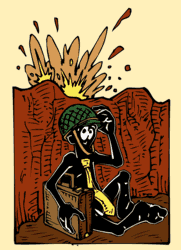 Foreign military intervention rarely works well in restoring a country to peace and good government. The interventions by Western coalitions in Iraq and Afghanistan have provided salutary lessons over the past decade, indicating that military intervention:
Foreign military intervention rarely works well in restoring a country to peace and good government. The interventions by Western coalitions in Iraq and Afghanistan have provided salutary lessons over the past decade, indicating that military intervention:
- tends to be vastly more expensive than initially estimated
- is usually a long-drawn-out process because of the enormous difficulties of guerrilla warfare
- typically results in weak governments which are subject to significant corruption
- results in security dependency, making it very difficult for intervening parties to withdraw
Thus members of the international community find it extremely difficult to decide when to intervene in a conflict situation, such as the conflicts which have been occurring in Sudan, or, more recently, the invasion of Mali by al-Qaeda Islamist forces. France has now taken action, sending in troops and aircraft on Friday in an attempt to drive back the invaders. The UN Security Council approved the intervention on Monday.
A small West African force was due to arrive in the country by the middle of this year, but that intervention was clearly going to be too late. France hopes that it will only have to be involved for a few weeks, but foreign interveners hoping for quick results often fail to achieve them. If the Islamists hold their ground for an extended period, France will be in a difficult position.